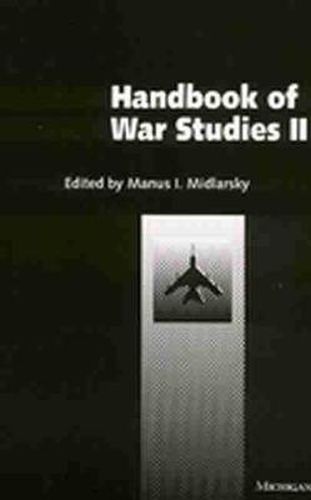Readings Newsletter
Become a Readings Member to make your shopping experience even easier.
Sign in or sign up for free!
You’re not far away from qualifying for FREE standard shipping within Australia
You’ve qualified for FREE standard shipping within Australia
The cart is loading…






This book is a compilation of the most recent theoretically and empirically oriented research on international warfare. Some of the chapters are updated from the earlier Handbook of War Studies; most are new contributions representing new understandings of the vast changes in international relations that have occurred during the past decade. The new themes addressed in the volume are democratic peace theory (Bruce Russett and Harvey Starr); ethnic or identity conflict and interstate conflict (Manus Midlarsky); terrorism (Martha Crenshaw); ancient warfare and enduring rivalries (Claudio Cioffi-Revilla); origins of dyadic conflicts (Gary Goertz and Paul Diehl); conflict escalation and interstate crisis (Jonathan Wilkenfeld and Michael Brecher); and escalation processes (John Vasquez). Also new to the Handbook is the analysis of game theory, here represented by the work of James Morrow and a necessary corrective supplied by Jack Levy. Important theoretical perspectives continued from the earlier Handbook are power transition and the power cycle (updated respectively by Jacek Kugler and Douglas Lemke, and Charles Doran) and concentration and deconcentration of global reach capabilities (Karen Rasler and William Thompson). Finally, Daniel Geller extensively reviews the major strains of empirical research on international warfare. This book is the single most comprehensive treatment of systematic research by political scientists on the causes of large-scale political violence. Overall, it tells us how far the discipline has progressed in developing a scientifically based understanding of the causes of war. Manus I. Midlarsky is Moses and Annuta Back Professor of International Peace and Conflict Resolution, Rutgers University-New Brunswick.
$9.00 standard shipping within Australia
FREE standard shipping within Australia for orders over $100.00
Express & International shipping calculated at checkout
This book is a compilation of the most recent theoretically and empirically oriented research on international warfare. Some of the chapters are updated from the earlier Handbook of War Studies; most are new contributions representing new understandings of the vast changes in international relations that have occurred during the past decade. The new themes addressed in the volume are democratic peace theory (Bruce Russett and Harvey Starr); ethnic or identity conflict and interstate conflict (Manus Midlarsky); terrorism (Martha Crenshaw); ancient warfare and enduring rivalries (Claudio Cioffi-Revilla); origins of dyadic conflicts (Gary Goertz and Paul Diehl); conflict escalation and interstate crisis (Jonathan Wilkenfeld and Michael Brecher); and escalation processes (John Vasquez). Also new to the Handbook is the analysis of game theory, here represented by the work of James Morrow and a necessary corrective supplied by Jack Levy. Important theoretical perspectives continued from the earlier Handbook are power transition and the power cycle (updated respectively by Jacek Kugler and Douglas Lemke, and Charles Doran) and concentration and deconcentration of global reach capabilities (Karen Rasler and William Thompson). Finally, Daniel Geller extensively reviews the major strains of empirical research on international warfare. This book is the single most comprehensive treatment of systematic research by political scientists on the causes of large-scale political violence. Overall, it tells us how far the discipline has progressed in developing a scientifically based understanding of the causes of war. Manus I. Midlarsky is Moses and Annuta Back Professor of International Peace and Conflict Resolution, Rutgers University-New Brunswick.